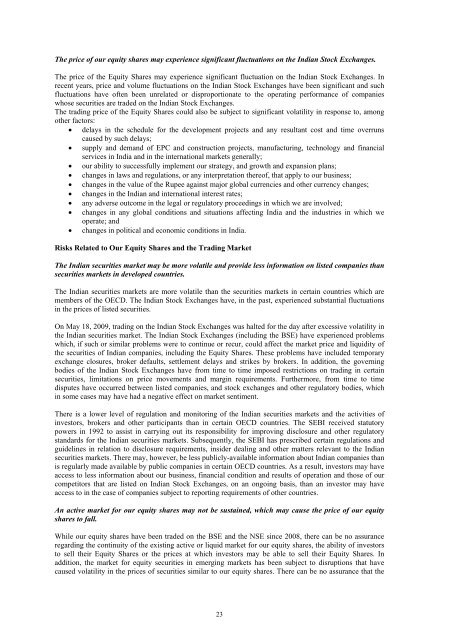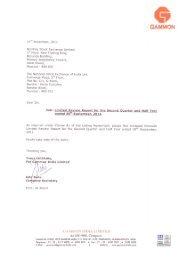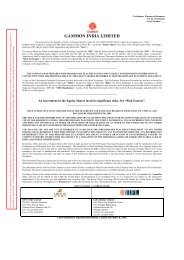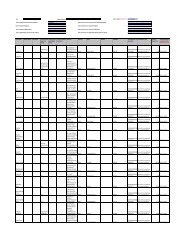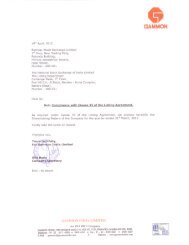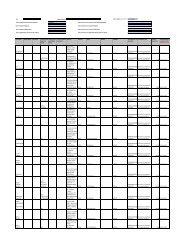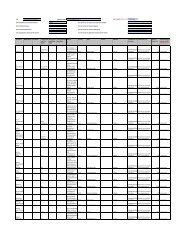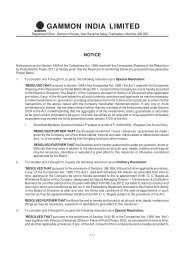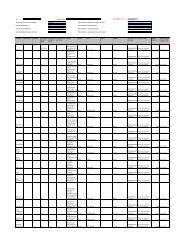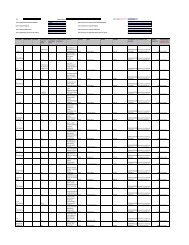GAMMON INDIA LIMITED
GAMMON INDIA LIMITED
GAMMON INDIA LIMITED
You also want an ePaper? Increase the reach of your titles
YUMPU automatically turns print PDFs into web optimized ePapers that Google loves.
The price of our equity shares may experience significant fluctuations on the Indian Stock Exchanges.<br />
The price of the Equity Shares may experience significant fluctuation on the Indian Stock Exchanges. In<br />
recent years, price and volume fluctuations on the Indian Stock Exchanges have been significant and such<br />
fluctuations have often been unrelated or disproportionate to the operating performance of companies<br />
whose securities are traded on the Indian Stock Exchanges.<br />
The trading price of the Equity Shares could also be subject to significant volatility in response to, among<br />
other factors:<br />
delays in the schedule for the development projects and any resultant cost and time overruns<br />
caused by such delays;<br />
supply and demand of EPC and construction projects, manufacturing, technology and financial<br />
services in India and in the international markets generally;<br />
our ability to successfully implement our strategy, and growth and expansion plans;<br />
changes in laws and regulations, or any interpretation thereof, that apply to our business;<br />
changes in the value of the Rupee against major global currencies and other currency changes;<br />
changes in the Indian and international interest rates;<br />
any adverse outcome in the legal or regulatory proceedings in which we are involved;<br />
changes in any global conditions and situations affecting India and the industries in which we<br />
operate; and<br />
changes in political and economic conditions in India.<br />
Risks Related to Our Equity Shares and the Trading Market<br />
The Indian securities market may be more volatile and provide less information on listed companies than<br />
securities markets in developed countries.<br />
The Indian securities markets are more volatile than the securities markets in certain countries which are<br />
members of the OECD. The Indian Stock Exchanges have, in the past, experienced substantial fluctuations<br />
in the prices of listed securities.<br />
On May 18, 2009, trading on the Indian Stock Exchanges was halted for the day after excessive volatility in<br />
the Indian securities market. The Indian Stock Exchanges (including the BSE) have experienced problems<br />
which, if such or similar problems were to continue or recur, could affect the market price and liquidity of<br />
the securities of Indian companies, including the Equity Shares. These problems have included temporary<br />
exchange closures, broker defaults, settlement delays and strikes by brokers. In addition, the governing<br />
bodies of the Indian Stock Exchanges have from time to time imposed restrictions on trading in certain<br />
securities, limitations on price movements and margin requirements. Furthermore, from time to time<br />
disputes have occurred between listed companies, and stock exchanges and other regulatory bodies, which<br />
in some cases may have had a negative effect on market sentiment.<br />
There is a lower level of regulation and monitoring of the Indian securities markets and the activities of<br />
investors, brokers and other participants than in certain OECD countries. The SEBI received statutory<br />
powers in 1992 to assist in carrying out its responsibility for improving disclosure and other regulatory<br />
standards for the Indian securities markets. Subsequently, the SEBI has prescribed certain regulations and<br />
guidelines in relation to disclosure requirements, insider dealing and other matters relevant to the Indian<br />
securities markets. There may, however, be less publicly-available information about Indian companies than<br />
is regularly made available by public companies in certain OECD countries. As a result, investors may have<br />
access to less information about our business, financial condition and results of operation and those of our<br />
competitors that are listed on Indian Stock Exchanges, on an ongoing basis, than an investor may have<br />
access to in the case of companies subject to reporting requirements of other countries.<br />
An active market for our equity shares may not be sustained, which may cause the price of our equity<br />
shares to fall.<br />
While our equity shares have been traded on the BSE and the NSE since 2008, there can be no assurance<br />
regarding the continuity of the existing active or liquid market for our equity shares, the ability of investors<br />
to sell their Equity Shares or the prices at which investors may be able to sell their Equity Shares. In<br />
addition, the market for equity securities in emerging markets has been subject to disruptions that have<br />
caused volatility in the prices of securities similar to our equity shares. There can be no assurance that the<br />
23


